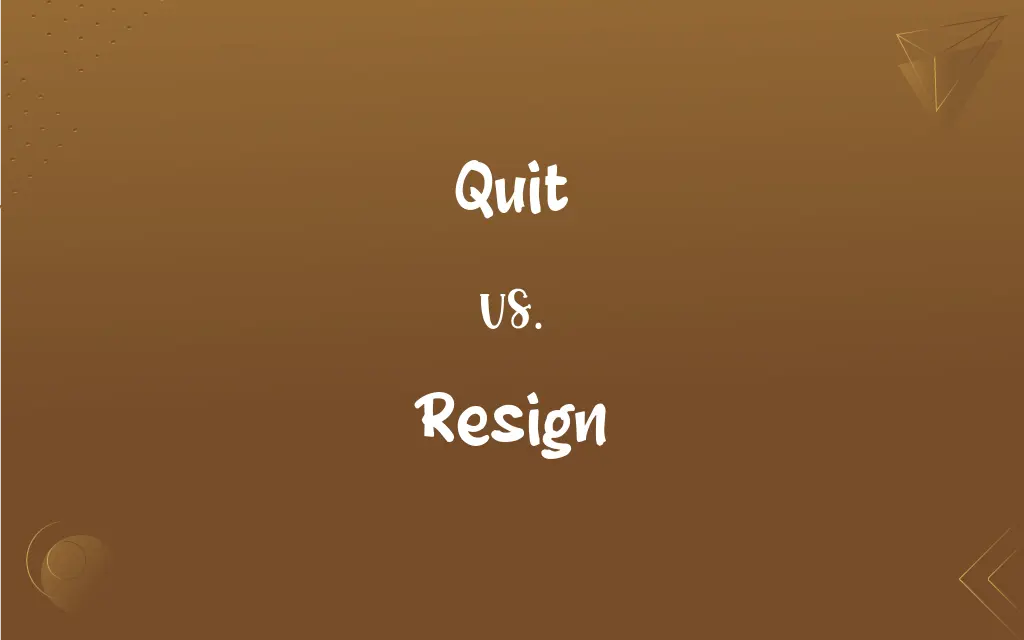The decision to leave a job is rarely an impulsive one. It often stems from a careful consideration of various factors, ranging from career aspirations to personal circumstances. While the terms “resigned” and “quit” might seem interchangeable, they subtly convey different intentions and implications. These nuances matter, not just for personal clarity, but also for navigating the professional landscape.

Image: www.difference.wiki
Imagine this: after months of frustration with your current role, you finally reach a breaking point. You decide to move on, but how do you communicate your departure? Do you say you “resigned” or “quit”? These words, though seemingly synonymous, subtly shape the perception of your decision, and potentially impact your future opportunities.
Delving Deeper: Resigned vs Quit
While both terms signify leaving a job, the difference lies in the underlying motivations and the formal process involved.
Resigned: A Formal and Considered Departure
Resigning implies a calculated and respectful departure. It involves a formal process, often with a written notification to your employer, specifying your last day of employment. This approach suggests you’ve carefully weighed your options, communicated your intentions proactively, and left on a positive note. Resigning is generally seen as a more mature and professional way to exit a job.
Quit: A More Abrupt and Informal Departure
Quitting, on the other hand, suggests a more immediate and potentially abrupt exit. It may involve less formality, sometimes even a simple verbal notification. Quitting can be perceived as less professional, particularly when it lacks proper notice or doesn’t address the reasons for leaving. It can raise questions about professionalism and commitment, especially if there’s a lack of clarity around the rationale behind the decision.

Image: www.seek.com.au
Navigating the Nuances in the Modern Workplace
The choice between resigning and quitting often depends on the specific circumstances and the relationship with your employer. Here’s a breakdown of factors to consider:
Factors Influencing Choice:
- Professional Relationship with Employer: If you have a good relationship with your employer and wish to retain a positive reputation, resigning is generally the preferred option.
- Future Opportunities: If you intend to seek recommendations from your current employer or explore future opportunities within the same company or industry, resigning allows you to maintain a professional bridge.
- Personal Circumstances: If you’re leaving due to pressing personal reasons, quitting might be necessary, but communicate your reasons clearly.
- Industry Practices: Certain industries might have specific protocols for leaving a job. It’s essential to understand these practices to avoid any negative implications.
- Legal Obligations: You may be obligated to provide a certain amount of notice before leaving, depending on your employment contract.
Tips for Navigating Resignations and Quitting
Regardless of your choice, communicating your decision effectively is crucial.
Resignation Tips:
- Submit a Formal Resignation Letter: A formal resignation letter outlines your decision to leave, your last day of employment, and a positive sentiment towards the company.
- Provide Adequate Notice: Give your employer sufficient notice, adhering to the terms of your employment contract or company policy.
- Offer Assistance with Transition: Proactively offer to help with the transition process, ensuring a smooth handover of responsibilities.
- Maintain Professionalism: Even if leaving under difficult circumstances, maintain a respectful and professional demeanor.
- Express Gratitude: Thank your employer for the opportunities you’ve experienced during your tenure.
Quitting Tips:
- Communicate Your Intention: Clearly communicate your intention to leave to your employer, even if it’s a verbal notification.
- Be Clear About Your Reasons: While not always necessary, providing reasons for leaving can help your employer understand your perspective.
- Avoid Negative Statements: Maintain your composure and avoid making negative remarks about the company or your colleagues.
- Fulfill Your Obligations: Complete any outstanding tasks or commitments before leaving.
- Leave on a Positive Note: End your employment on a positive note, leaving the door open for future possibilities.
FAQs: Resigned vs Quit
Resignation and quitting remain common workplace scenarios. Here are some frequently asked questions about these concepts:
Q: What is the legal difference between resigning and quitting?
A: From a legal standpoint, both acts essentially mean leaving employment, with minimal differences. However, certain employment contracts might have clauses specific to resignation, including notice periods and severance packages.
Q: Can I change my mind after I “quit”?
A: It depends on the circumstances and your employer’s response. If you haven’t officially concluded your employment, there’s a chance you might be able to retract your decision. However, it’s always advisable to approach your employer with clarity and professionalism in this situation.
Q: Which term should I use on my resume?
A: For optimal clarity, it’s best to use “resigned” on your resume, as it implies a more planned and considered departure. However, if you genuinely “quit” due to compelling reasons, you can explain the circumstances on your resume or during interviews.
Resigned Vs Quit
Conclusion
Understanding the nuances of resigning vs quitting is essential for navigating the professional landscape. Resigning generally portrays a more formal and professional approach, while quitting can be perceived as more abrupt. The key lies in communicating clearly, respectfully, and with clarity, regardless of your choice.
Have you ever had to resign or quit a job? Share your experience in the comments below!






